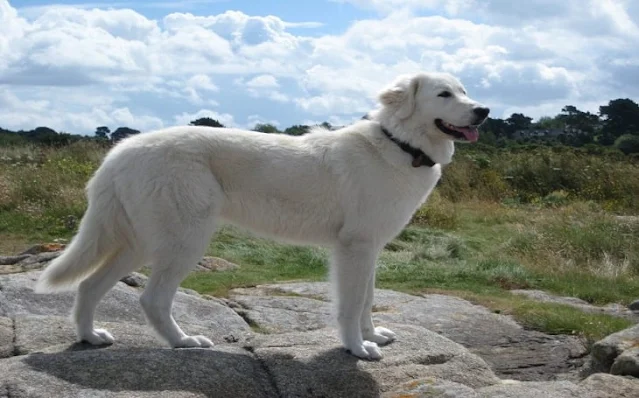Maremma Sheepdog Breed Information:
The Maremma Sheepdog is considered an “Old World European” breed, sharing ancestry with other Eastern European livestock guardian dogs, especially mountain-dwelling dogs, like the Pyrenean Mountain Dog and Kuvasz. Maremma Sheepdogs can be traced back at least to ancient Roman times. Originally bred in Italy, they are still very popular there, and their original purpose continues on: to guard livestock.
Maremma Sheepdog Group: Working Dogs.
Maremma Sheepdog Height: 23.5 to 28.5 inches.
Maremma Sheepdog Weight: 65 to 100 pounds.
Maremma Sheepdog Life Span: 11 to 13 years.
More About This Dog Breed:
Maremma Sheepdogs are great guardians for all types of animals, not just sheep. Their ideal environment would be a farm, where they can put their genetic gifts of livestock guarding to good use. They do not do well being alone for long periods of time. Maremma Sheepdogs are white, with some variation of shading allowed. Their fur is long, thick, and coarse. These dogs do shed quite a bit and may not be best for allergy sufferers.
Maremma Sheepdog History:
Maremma Sheepdogs date back at least to ancient Roman times 2000 years ago, and possibly earlier. They are closely related to other Eastern European livestock guarding dogs, and they all are thought to be descendants of the Tibetan Mastiff, a breed that dates back even more millennia. Archaeologists have discovered bones from these types of livestock guarding dogs next to bones of livestock dating back 6000 years.
Maremma Sheepdog Size:
MaremmaSheepdogs are a large breed. Males tend to range from 25.5 to 28.5 inches tall, and females 25.5 to 26.75 inches, with some being smaller. Weights are usually 77 to 100 pounds for males and 66 to 88 pounds for females.
Maremma Sheepdog Personality:
Maremma Sheepdogs are loyal, as dedicated to their job as they are to their families, human and animal. They do best when allowed lots of space to be active and independent. Early training and socialization can help them to adapt to your house and family, but keep in mind, while they're not particularly destructive or mischievous, they are independent thinkers.
Also Read This : All Dog Breeds - Names and Pictures | Complete List of Dog Profiles
Maremma Sheepdog Health:
Maremma Sheepdogs are generally pretty healthy dogs and may never develop issues during their lifetime. However, there are a few health problems to watch out for in this breed, which are more common among larger dogs:
Sensitivity to anesthesia and tick/flea sprays.
Eye problems.
Hip or elbow dysplasia.
Bloat.
Maremma Sheepdog Care:
Proper training early on is especially important for Maremma Sheepdogs. Make sure they have plenty of water and shade in the summer. As with all dogs, regular dental care brushing their teeth a few times a week or other brushing alternatives and nail trims one or two times per month are important. Also be sure to check your dog's ears regularly for irritation or debris.
Maremma Sheepdog Feeding:
As with all dogs, the Maremma Sheepdog's dietary needs will change from puppyhood to adulthood and will continue to change into their senior years. You should ask your veterinarian for recommendations about your Maremma Sheepdog's diet.
Maremma Sheepdog Coat Color And Grooming:
Maremma Sheepdogs are white, with some variation of shading allowed. A tinge of yellow, peach, or orange is acceptable. Maremma Sheepdogs' thick coats are great for keeping them warm in the winter, but less ideal for keeping them cool during the summer. However, these dogs do pretty well in all temperatures, provided they have some form of shade or shelter from extreme heat, cold, sun, and precipitation.
Maremma Sheepdog with Children And Other Pets:
Maremma Sheepdogs are known to do very well with children within their own family. They may have trouble with children outside of the family. Maremmas often do very well with other animals, too, especially livestock like sheep, llamas, geese, pigs, etc., as well as cats.

